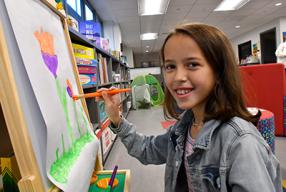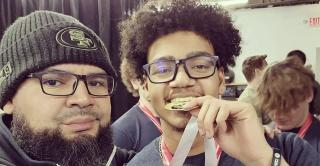

Our comprehensive early childhood curriculum is designed to meet the individual needs of each child. Taking advantage of the natural curiosity of our young students, we utilize purposeful play in combination with an inquiry-based approach to learning. This approach enhances the development of early critical thinking and reasoning skills while enabling each child to progress at their own individual pace. Our student-centered curriculum covers many subject areas including social & emotional, cognition, language & literacy, math, science, technology, social studies, movement, music, and art education. Students become stimulated throughout the year with our monthly themes and lessons that strongly align with the Connecticut Early Learning and Development Standards and Connecticut Preschool Curriculum Framework. Each day students are engaged in a wide variety of rich activities. The activities are developmentally appropriate, intentionally selected, and designed to include large-group, small-group, and one-to-one teacher time.
Our pre-kindergarten program draws reference from the following curriculum guides:
The Creative Curriculum for Preschool
The Creative Curriculum for Preschool is based on five fundamental principles. With these principles in mind, our teachers can support the development and learning of the whole child.
- Positive interactions and relationships with adults provide children with a critical foundation for successful learning.
- Social-emotional competence is a significant factor in school success.
- Constructive, purposeful play supports essential learning.
- The physical environment affects the type and quality of learning interactions and experiences.
- Teacher-family partnerships promote children’s development and learning.
Heggerty Phonemic Awareness Pre-Kindergarten Curriculum
Phonemic awareness is the understanding that spoken words are made up of individual sounds, which are called phonemes. Phonemic awareness includes the ability to isolate sounds, manipulate sounds, blend and segment the sounds into spoken and written words. Phonemic awareness training provides the foundation on which phonics instruction is built.
Wilson Foundations Pre-K Program
The specific activities are designed to support students’ emerging understanding of the alphabetic principle of letter-sound associations, and the written language skill of manuscript letter formation. Its purpose is to teach pre-k students the names of the letters and the corresponding sounds, as well as teach them the formation of lowercase and uppercase letters.
The First Steps in Music for Preschool and Beyond
The First Steps in Music curriculum is designed to prepare children to become musical in three ways:
- Tuneful – to have tunes in their heads and learn to coordinate their voices to sing those tunes.
- Beautiful – to feel the pulse of music and how that pulse is grouped in either 2s or 3s.
- Artful – to be moved by music in the many ways music can elicit an emotional response.
Our musical activities include:
Songs and Rhymes
Echo Songs
Call and Response
Fingerplays and Action Songs
Songtales
Circle Games
Movement Exploration
CASEL and Shape America: Social and Emotional Learning
Social and emotional learning (SEL) is the process through which children and adults acquire and effectively apply the knowledge, attitudes, and skills necessary to understand and manage emotions, set and achieve positive goals, feel and show empathy for others, establish and maintain positive relationships, and make responsible decisions. (CASEL)
Character Development
The Central Drop-In Child Care Center works closely with our families to contribute to the development of our young children’s values. Character development is woven into the curriculum throughout the year with a focus on the following:
Honesty
Respect
Kindness
Responsibility
Patience
Acceptance
Monthly Themes
Balls
Buildings
Clothes
Exercise
Wheels
Water
Trees
Reduce, Reuse, Recycle
Pre-Kindergarten Daily Activity Schedule
Our daily schedule blocks out time and establishes a sequence for routines and experiences. A good schedule for preschool students is balanced, offering choices and a range of activities, some initiated by children and others planned by teachers. A daily schedule establishes the consistency that helps young children predict the sequence of daily events and thus feel more secure and in control of events.
- Welcome and Open Exploration
- Circle Time; calendar, music and movement, theme lesson
- Learning Centers and Theme Art Activity
- Snack
- Outside exploration
- Read aloud & small groups
- Closing Circle
Learning Centers
Learning centers are a vital part of a high-quality preschool program. Centers allow young children to learn in the most meaningful way, through hands-on play experiences. Our learning centers are designed to encourage critical thinking about skills and concepts and apply them to enhance their learning.
Blocks and Building Center
The Block and Building Center incorporates a variety of blocks, building materials, and inspirational props. The type of blocks in the center changes throughout the school year and connect with monthly themes, keeping learners actively engaged and developing fine motor skills. This center offers many opportunities for learning through imaginative play. Children expand their vocabulary and oral language skills when they are introduced to new content specific words and engage in discussions about their creations. Children learn about math and science as they explore concepts including shapes, patterns, measurement, balance, and textures. This setting encourages creativity through dramatic play and the construction of original designs and structures.
Drama Center
The Drama Center is a place where children can take on a role and pretend. Dramatic play is central to children’s healthy development and learning during the preschool years. When children engage in dramatic play, they deepen their understanding of the world as they learn and develop skills that will serve them throughout their lives. To engage in dramatic play with others, children have to negotiate roles, agree on a topic, and cooperate to portray different situations. They can recreate life experiences and try to cope with emotions by acting out roles in a variety of scenarios. They practice fine motor skills, hand-eye coordination, and visual discrimination. They use oral language, reading, and writing skills. When children pretend, they develop images in their minds and make connections to prior knowledge, experiences, and situations. These images are a form of abstract thinking. The drama center facilitates the exploration of math concepts, sharing ideas, and problem-solving.
Language and Literacy Center
The Language and Literacy Center is an inviting space with soft furniture, beautiful picture books, and corresponding props and manipulatives. This is a place for children to develop the motivation and skills necessary for reading and writing. They can listen to stories read aloud, look through books independently, re-tell familiar stories, and make up their own stories. They practice and strengthen all of the aspects of language and literacy, (reading, writing, listening, and speaking). Comprehension grows as they learn new words and develop phonological awareness when they hear and explore the sound of language through books. Books help children gain a better understanding of the world around them, begin to interpret symbols, make predictions, and think about cause and effect. Through books, children also develop an understanding about counting, number recognition, color, size, and shape.
Sensory Table
This center involves sensory experiences that appeal to young children including sand, water, and much more! In this space, play delights the senses, challenges children’s minds, and promotes all areas of development. The sensory table activities can inspire children to work together, express thoughts and feelings, and have a calming effect. Fine motor skills and hand-eye coordination is developed working with props, funnels, sieves, molds, and measuring cups. Objects that sink and float inspire inquiry about cause and effect. Children expand their vocabulary and build emerging literacy skills. Scientific exploration of liquids, solids, textures, volume, and capacity promote hands-on, student-centered learning opportunities.
Math & Science Center
In the Math and Science Center, children will become engaged in activities that include numbers, counting, sequencing, matching, sorting, and classifying. Children will play games and work with manipulatives that build mathematical thinking skills. This space also supports children’s scientific inquiry and knowledge through observation and hands-on exploration. Key content and scientific principals will include the difference between living and non-living, life cycles, earth and sky. The materials and activities in this center, encourages children to use their five senses to observe, explore and experiment with scientific phenomena.
Writing Center
In this center, children have multiple and varied opportunities to identify letters, make connections between letters and the sounds they represent, and experiment with a wide variety of materials including: multiple types of writing implements, paper, clay, foam, lacing cards, books, puzzles, and games. Children play with the sounds of language using rhymes, poems, songs and finger play. The writing center encourages various types of drawing, coloring, and writing including scribbling, letter-like marks, and developmental spelling. Self-initiated efforts to write letters that represent the sound of words are encouraged. Activities in this area strengthen fine motor skills, letter identification, and phonemic awareness.
Enrichment Program
Enrichment activities are planned for children ages 3-5, 6-8, and 9-12. Enrichment activities may include:
Enrichment Ages 3-5
- Circle Time Activities
- Center Exploration
- Arts and Crafts
- Music and Movement
- Outdoor Exploration
Enrichment Ages 6-8
- Study Skills
- Old School Games Club
- Outside the Lines Arts & Crafts
- Where the Wild Things Are Book Club
- Calm Classroom Mindfulness
- Maker Space
- Outdoor Activities
Enrichment Ages 9-12
- Study Skills
- Old School Games Club
- Live in Color Arts & Crafts
- Bookworms Club
- ZEN Yoga Club
- Maker Space
- Outdoor Activities


